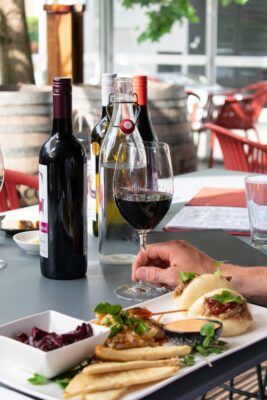4 Best Practices for a BYOB Restaurant

One popular type of establishment in Texas is the BYOB restaurant. Most people know what BYOB entails as a guest, but operating one of these locations as a business owner or manager may be confusing. Although the TABC certification course doesn’t cover BYOB, here are 4 best practices you should be aware of:
1. Follow Minimum Age and Public Intoxication Laws
Running a BYOB establishment doesn’t mean you allow patrons to bring drinks in from the outside and they get to do whatever they want. Texas alcohol laws still apply, and that includes the minimum age to possess or consume alcohol and public intoxication.
- The minimum age to possess or consume alcohol in Texas is 21, and that still applies at BYOB establishments. Minors may possess and consume alcohol while in the visible presence of their legal-aged parent, guardian, or spouse, but your establishment doesn’t have to allow it. You can prohibit minors from possessing or consuming alcohol on your premises.
- Public Intoxication is still against the law on the property of a BYOB establishment. If one of your customers is intoxicated to the degree that they pose a danger to themselves or others, they are in violation of Chapter 49.02 of the Texas Penal Code.
2. Charge Customers a Fee If You Want
The traditional BYOB restaurant or establishment is one that allows customers to bring their own libations. In the traditional setting, customers bring, serve, and prepare their beverages themselves.
Although this is common, there are ways to better accommodate your customers in a BYOB setting and even make money while doing so:
- You can sell “set ups” of cups, ice, soda and other mixers
- You can charge a fee for the customer to bring alcohol onto your premises. This is particularly common when a customer brings their own bottle of wine into a restaurant. The fee is often referred to as a “corkage fee.”
3. Know the Legal Limits of What Can Be Brought In
There are no statewide BYOB laws in Texas. Even though the term means “Bring Your Own Beverage,” that doesn’t mean you can bring any type of alcoholic beverage to any type of establishment. If the establishment has a private club permit or mixed beverage permit, it is illegal to bring any type of alcoholic beverage on the premises.
Where it is legal for guests to bring in alcoholic beverages, there are still other alcohol-related laws that must be followed.
4. Know the Legal Hours of Public Consumption
If you operate a BYOB establishment or hold an event in a public place, the legal hours of public consumption of alcohol still apply to you. Just because your establishment or organization may not have a TABC permit, it doesn’t mean guests can drink alcohol on the premises all night.
According to the TABC website, legal hours of public consumption start at 7:00 AM Monday through Saturday and at 12:00 PM (noon) on Sunday. Legal hours of public consumption end at 2:15 AM if the area is legal for extended hours. Otherwise, legal hours of public consumption end at 12:15 AM Sunday night through Friday night, and 1:15 AM Saturday night.
Stay Ahead with TABC On The Fly!
Just like with any restaurant, running a BYOB establishment can be complex. This is especially true if you are not TABC certified. While it is not the law to have to be certified to serve alcohol at your restaurant, it certainly helps. The majority of employers across the state of Texas require their employees to be TABC certified because they recognize the value of ensuring employees are trained well.
By becoming certified with TABC On The Fly, you will quickly gain knowledge that will be extremely helpful in educating yourself and your staff on serving alcohol, knowing when someone is reaching or has reached their limit, and so much more. The best part is, it can be done from the comfort of your home through our online course. Register today to get certified and keep yourself and your business a step ahead of the competition.
Back to Blog